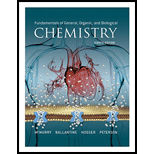
Concept explainers
(a)
Interpretation:
The change in entropy whether increases or decreases for the given process has to be determined.
Concept Introduction:
Entropy
If the disorder increases in a system, then
If the disorder decreases in a system, then
(b)
Interpretation:
The change in entropy whether increases or decreases for the given process has to be determined.
Concept Introduction:
Entropy
If the disorder increases in a system, then
If the disorder decreases in a system, then
(c)
Interpretation:
The change in entropy whether increases or decreases for the given process has to be determined.
Concept Introduction:
Entropy
If the disorder increases in a system, then
If the disorder decreases in a system, then
Want to see the full answer?
Check out a sample textbook solution
Chapter 7 Solutions
Fundamentals of General, Organic, and Biological Chemistry - With Access
- Kevin was experiencing heartburn prior to his heart attack, for which he was taking an antacid containing calcium carbonate (CaCO3). Which of the following statements is true concerning the electron shells associated with CaCO3?arrow_forwardIf the cells of your body oxidize 1 mole of glucose, by how much would the temperature of your body (assume that your body consists of 75 kg of water) increase if the heat were not dissipated into the environment?arrow_forwardHow many protons per citric acid molecule are ionizable?arrow_forward
- A muscle can be thought of as a fuel cell, producing work from themetabolism of glucose: C6H12O6 + 6O2 → 6CO2 +6H2O Use the concept of entropy to explain why the heat flows in the direction it does.arrow_forwardConsider the following process: NaCl(s) water−→−−water→ Na+(aq) + Cl-(aq); ΔH = +4.2 kJ/mol Under what conditions (temperature) would you expect this process to be spontaneous? Select a relatively high temperature and a relatively low temperature, calculate (estimate) the relative values of ΔG to support your conclusion. The entropy increases in this process Please insert an image of your workarrow_forwardWhich of the following correctly explains why the vapor pressure of water has to be included in the calculations? Some of the liquid water evaporates into the gas, and increases the total pressure generated by the trapped gas. As the H2(g) is bubbled up the reaction solution, some of the H2(g) molecules are solubilized by water in the aqueous solution, effectively decreasing the measured pressure above. The pressure contributed by the H2(g) is greater than the measured total pressure because of the contribution of partial pressure of water vapor. The pressure exerted by the evolved H2(g) is reduced because of the co-presence of water vapor, thus Pwater vapor has to be added to Pdry gas. Overview of the experiment:arrow_forward
- Energy and Enzymes If the following redox reaction occurred, which compounds would be oxidized? Reduced?arrow_forwardWhen sodium chloride forms, which element - sodium or chlorine - is oxidized? Which one is reduced?arrow_forwardWhich of the following correctly describes the linkages found in ATP? two anhydrides, a phospho ester and a glycosidic bond two anhydrides, two phospho esters and a glycosidic bond three anhydrides, a phospho ester and a glycosidic bond one anhydride, two esters and a glycosidic bondarrow_forward
- Examine the chemical equation below, and label each reactant and product. (which is a reactant and product) H2O + CO2 ⇋ H2CO3 ⇋ HCO3- + H+ If you are blowing CO2 from your lung into a water solution, will it make the solution more acidic or basic?arrow_forwardWhat happens if the non-cyclic electron flow is inhibited?arrow_forwardA chemical reaction has a △G of -14 kcal/mol. Adding an enzyme has been shown to increase the reaction 10-fold. What would be the △G of the reaction when that enzyme is added? A) -1.4 kcal/mol B) -14 kcal/mol C) +14 kcal/mol D) -140 kcal/molarrow_forward
 Biology 2eBiologyISBN:9781947172517Author:Matthew Douglas, Jung Choi, Mary Ann ClarkPublisher:OpenStax
Biology 2eBiologyISBN:9781947172517Author:Matthew Douglas, Jung Choi, Mary Ann ClarkPublisher:OpenStax
